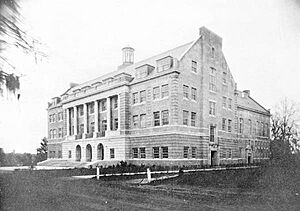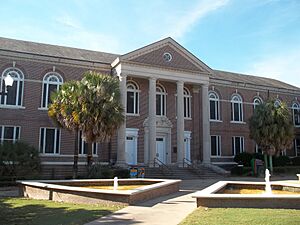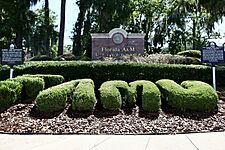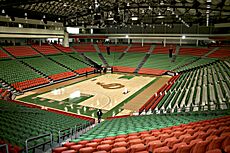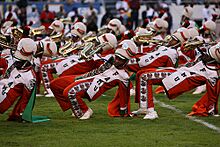- This page was last modified on 17 October 2025, at 10:18. Suggest an edit.
Florida A&M University facts for kids
"FAMU" redirects here. For the Czech film school, see Film and TV School of the Academy of Performing Arts in Prague.
 |
|
|
Former names
|
Florida Agricultural and Mechanical College for Negroes (1909–1953) State Normal and Industrial College for Colored Students (1891–1909) State Normal College for Colored Students (1887–1891) |
|---|---|
| Motto | "Head, Heart, Hand, Field" "Excellence With Caring" |
| Type | Public historically black land-grant university |
| Established | October 3, 1887 |
|
Parent institution
|
State University System of Florida |
| Accreditation | SACS |
|
Academic affiliations
|
|
| Endowment | $95.6 million (2020) |
| Budget | $375 million (2020) |
| President | Timothy L. Beard |
|
Academic staff
|
687 (561 full-time) |
| Students | 10,028 (fall 2023) |
| Location |
,
United States
30°25′04″N 84°17′04″W / 30.4178°N 84.2845°W |
| Campus | Midsize city, 422 acres (1.7 km2) |
| Other campuses | |
| Newspaper | The FAMUAN |
| Colors | Orange(PANTONE 151 C) and Green(PANTONE 348 C) |
| Nickname | Rattlers and Lady Rattlers |
|
Sporting affiliations
|
NCAA Division I FCS – SWAC |
| Mascot | Venom the Rattlesnake |
Florida Agricultural and Mechanical University (FAMU), also known as Florida A&M, is a public university in Tallahassee, Florida. It is a historically black university (HBCU). This means it was founded to provide higher education for African American students. FAMU started in 1887.
It is the third-largest historically black university in the United States. It is also the only public historically black university in Florida. FAMU is part of the State University System of Florida. It offers bachelor's, master's, and doctoral degrees.
FAMU's sports teams are called the Rattlers. They compete in Division I of the NCAA. They are part of the Southwestern Athletic Conference (SWAC).
Contents
History of FAMU
How FAMU Began
The idea for FAMU started in 1885. A Black abolitionist named Jonathan C. Gibbs suggested creating a college. It was called the State Normal College for Colored Students. This happened after he was elected to the Florida Legislature.
The college was built in Tallahassee. This area had a large African-American population. The university's land was once a large plantation.
Early Years and Name Changes
Classes at the State Normal College for Colored Students began on October 3, 1887. Four years later, it became a land-grant college. This meant it received special funding to teach agriculture and mechanical arts. Its name changed to State Normal and Industrial College for Colored Students.
In 1905, a law called the Buckman Act made it an official higher education institution. This act also helped create the University of Florida and Florida State University. The college's name changed again in 1909 to Florida Agricultural and Mechanical College for Negroes. Finally, in 1953, it became Florida Agricultural and Mechanical University. FAMU is the only public historically black college or university still operating in Florida.
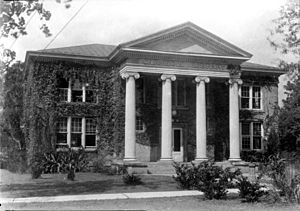
Carnegie Library around 1930.
Student Protests and Progress
In 1923, students at FAMU went on strike. This happened because the governor tried to remove the liberal arts program. He wanted the school to focus only on job training. Students protested, and some buildings were damaged. Eventually, the liberal arts program was brought back.
In 1951, FAMU started programs for pharmacy and nursing. To help students get real experience, the university built a hospital. Until 1971, the Florida A&M Hospital was the only one in the area that served African Americans. It closed when other hospitals began serving all people.
FAMU students also played a role in the Civil Rights Movement. In 1956, two students were arrested. This led to the Tallahassee bus boycott. The boycott aimed to end racial segregation on city buses. In 1963, FAMU students protested against segregation in the city.
Recent Events and Leadership Changes
FAMU has been recognized for its academic achievements. In 1997, Time and Princeton Review named it "College of the Year." In 1999, it was noted for awarding many degrees to African Americans.
In 2011, a sad event involving a student band member led to changes at the university. This included the resignation of FAMU's president. In 2019, FAMU partnered with Adtalem Global Education and Ross University School of Medicine.
In 2024, a large donation to FAMU was questioned. This led to an investigation. The university later found that the donation had no real value. This situation led to the resignation of the university president.
FAMU Presidents
- Thomas Desaille Tucker (1887–1901)
- Nathan B. Young (1901–1923)
- William A. Howard (1923–1924)
- John Robert Edward Lee (1924–1944)
- J.B. Bragg (April 5, 1944 – September 1, 1944)
- William H. Gray, Jr. (1944–1949)
- H. Manning Efferson (July 7, 1949 – April 1, 1950)
- George W. Gore (1950–1968)
- Benjamin L. Perry, Jr. (1968–1977)
- Walter L. Smith (1977–1985)
- Frederick S. Humphries (1985–2001)
- Henry Lewis III (January 2002 – June 2002)
- Fred Gainous (2002–2004)
- Castell V. Bryant (January 2005 – May 2007)
- James H. Ammons (July 2, 2007 – July 16, 2012)
- Elmira Mangum (April 1, 2014 – September 15, 2016)
- Larry Robinson (November 30, 2017 – July 2024)
- Timothy L. Beard (August 5, 2024, interim)
Academics at FAMU
Degree Programs and Schools
FAMU offers many different study programs. Students can choose from 54 bachelor's degrees, 29 master's degrees, and 12 doctoral degrees. The university has 14 schools and colleges. There is also an honors program for students who achieve high grades.
FAMU is a member of the Thurgood Marshall Scholarship Fund. This fund helps students attend historically black colleges and universities.
Colleges and Schools at FAMU
FAMU offers degrees through these colleges and schools:
- College of Agriculture and Food Sciences
- College of Education
- FAMU - FSU College of Engineering
- College of Law
- College of Pharmacy and Pharmaceutical Sciences, Institute of Public Health
- College of Social Sciences, Arts, and Humanities
- College of Science and Technology
- School of Allied Health Sciences
- School of Architecture and Engineering Technology
- School of Business and Industry
- School of the Environment
- School of Graduate Studies and Research
- School of Journalism and Graphic Communication
- School of Nursing
Student Body and Diversity
FAMU has nearly 10,000 students. They come from all over the United States and other countries. Most students are African-American (about 83%). Other groups include Hispanic students (6%) and White students (7%).
University Rankings and Research
FAMU is recognized as a strong university. In 2024, U.S. News & World Report ranked FAMU highly. It was ranked 170th among national universities. It was also ranked 3rd among all HBCUs.
FAMU is also known for its research. The university receives about $44.5 million each year for research. Its main research areas are agriculture and health sciences.
FAMU Campus Life
Campus Locations
FAMU's main campus is in Tallahassee, Florida. It is located south of the State Capitol. It is also near the campus of Florida State University. FAMU has other locations too. There is a law school campus in Orlando, Florida. There are also pharmacy campuses in other Florida cities.
Student Housing
First-year students at FAMU usually live on campus. This is required if their families live far away. FAMU has eight residence halls. They can house over 2,500 students. Students can choose from different types of rooms. In 2020, FAMU opened the FAMU Towers. This new residence hall has co-ed floors and many double rooms.
Historic Campus Areas
Part of the FAMU campus is a National Historic District. This means it has important historical buildings. It was added to the list in 1996. The district includes 14 historic buildings. One special building is the old Carnegie Library.
Libraries and Resources
The main library at FAMU is the Samuel H. Coleman Memorial Library. It is named after a former alumni president. The original library building was destroyed by fire in 1905. Andrew Carnegie donated money to build a new one. The current library was built in 1948. It has been updated several times. It offers study rooms, a cafe, and many books. The libraries hold almost 2 million books.
The historic Carnegie Library building no longer serves as a library. It now houses the Southeastern Regional Black Archives Research Center and Museum.
FAMU Athletics
FAMU's sports teams are called the Rattlers. They compete in NCAA Division I-FCS. FAMU offers many sports for men and women.
Football Success
The FAMU football team has a rich history. From 1938 to 1961, they won the Black College National Championship eight times. Six of these wins were under coach Jake Gaither. He was a very successful coach. His teams had an amazing winning record. Many of his players went on to play in the National Football League. Coach Gaither was elected to the College Football Hall of Fame. In 1978, FAMU won the first NCAA D1-AA National Championship.
Basketball Achievements
The men's basketball team has also done well. They have qualified for the NCAA men's basketball tournament three times. This happened in 1999, 2004, and 2007.
Student Life at FAMU
FAMU is a large HBCU. It has almost 10,000 students. People in the FAMU community often call themselves "FAMUly" or "Rattler Nation." There are over 100 student organizations on campus.
Student Government and Traditions
The Student Government Association (SGA) is the official voice for students. It has three parts: Executive, Judicial, and Legislative.
FAMU also has a "Royal Court." This includes Miss FAMU and Mister FAMU. They are elected by students. Other students are chosen to represent the university as "attendants" and "escorts."
Music and Military Programs
The FAMU Gospel Choir started in 1957. It is a well-known student group.
FAMU has ROTC programs for the Army and Navy. These programs help students become officers in the U.S. Army, U.S. Navy, or U.S. Marine Corps. Students can also join the Air Force ROTC at nearby Florida State University.
The Marching 100 Band
The FAMU marching band is famous. It is called the Marching 100. They have performed at many important events. This includes presidential inauguration parades for Bill Clinton and Barack Obama. They have also performed at the Super Bowl. In 2019, they marched in the Rose Parade in California.
Student Media
FAMU students run several media outlets:
- The FAMUAN – The student newspaper.
- Journey Magazine – The student magazine.
- FAMU 20 TV – The university's TV news broadcast.
- WANM 90.5 FM – The university's radio station.
Notable People from FAMU
Many successful people have attended or worked at FAMU.
Notable Alumni
- Cannonball Adderley (born 1928) – A famous jazz saxophonist.
- Althea Gibson (born 1927) – The first African American to win a Grand Slam tennis title.
- Bob Hayes (born 1942) – The only athlete to win both an Olympic gold medal and a Super Bowl ring.
- Andre Dawson (born 1954) – A Baseball Hall of Fame inductee.
- Pam Oliver (born 1960/1961) – A well-known sportscaster.
- T'Keyah Crystal Keymáh (born 1962) – An actress and singer.
- Kimberly Godwin – The first Black woman to lead a major American network's broadcast news division (ABC News).
- Keisha Lance Bottoms (born 1970) – Former mayor of Atlanta, Georgia.
- Common (rapper) (born 1972) – A famous rapper and actor.
- Anika Noni Rose (born 1972) – An actress and singer, known for voicing Disney's first African-American princess, Tiana.
- Will Packer (born 1974) – A film producer known for many hit comedies.
- Roy Wood Jr. (born 1978) – A comedian and actor.
- Karamo Brown (born 1980) – A host on the TV show Queer Eye.
- Ibram X Kendi (born 1982) – An author and professor.
Notable Faculty
- D. Antoinette Handy – A flautist and music scholar.
See also
 In Spanish: Universidad Agrónoma y Mecánica de Florida para niños
In Spanish: Universidad Agrónoma y Mecánica de Florida para niños
- List of Florida Agricultural and Mechanical University alumni
- Florida Classic

